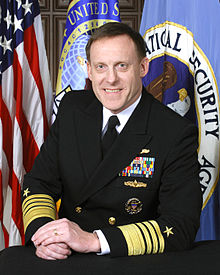Michael S. Rogers
| Michael S. Rogers | |
|---|---|
 |
|
| 17th Director of the National Security Agency | |
|
Assumed office April 3, 2014 |
|
| President |
Barack Obama Donald Trump |
| Deputy | Richard Ledgett |
| Preceded by | Keith Alexander |
| 2nd Commander of the United States Cyber Command | |
|
Assumed office April 3, 2014 |
|
| President |
Barack Obama Donald Trump |
| Preceded by | Keith Alexander |
| Personal details | |
| Born |
October 31, 1959 Chicago, Illinois, U.S. |
| Education |
Auburn University (BA) Naval War College (MS) |
| Military service | |
| Allegiance |
|
| Service/branch |
|
| Years of service | 1981–present |
| Rank |
|
| Commands |
U.S. Cyber Command National Security Agency U.S. Fleet Cyber Command U.S. Tenth Fleet |
| Battles/wars |
Invasion of Grenada Multinational Force in Lebanon |
Michael S. "Mike" Rogers (born October 31, 1959) is a United States Navy Admiral who serves as Director of the National Security Agency (NSA), Commander of the U.S. Cyber Command (USCYBERCOM) and Chief of the Central Security Service (CSS) since April 3, 2014. Prior to that, Rogers served as the commanding Admiral of the Tenth Fleet and Commander of the U.S. Fleet Cyber Command.
Rogers is a native of Chicago, Illinois. He graduated from New Trier High School in 1977. He is a graduate of Auburn University (1981) and the Naval War College.
Rogers received his commission through the Naval Reserve Officers Training Corps (NROTC) program and has served in the United States Navy since graduating from Auburn University in 1981. He started his career as a Surface Warfare Officer working in naval gunfire support operations off Grenada, Beirut, and maritime surveillance operations off El Salvador. In 1986, he was selected for transfer from Unrestricted Line Officer to Restricted Line Officer and re-designation as a cryptology officer.
During the 2003 U.S. invasion of Iraq, Rogers joined the military's Joint Staff, which works for the Joint Chiefs of Staff, where he specialized in computer network attacks. From 2007 onward he served as director of intelligence for the military's Pacific Command. In 2009, he became director of intelligence for the Joint Chiefs of Staff, and was subsequently named commander of U.S. Fleet Cyber Command and commander of the U.S. 10th Fleet, with responsibility for all of the Navy's cyberwarfare efforts. As such, Rogers was the first restricted line officer to serve as a numbered fleet commander and the first Information Warfare Community (IWC) officer to achieve the rank of vice admiral.
...
Wikipedia
